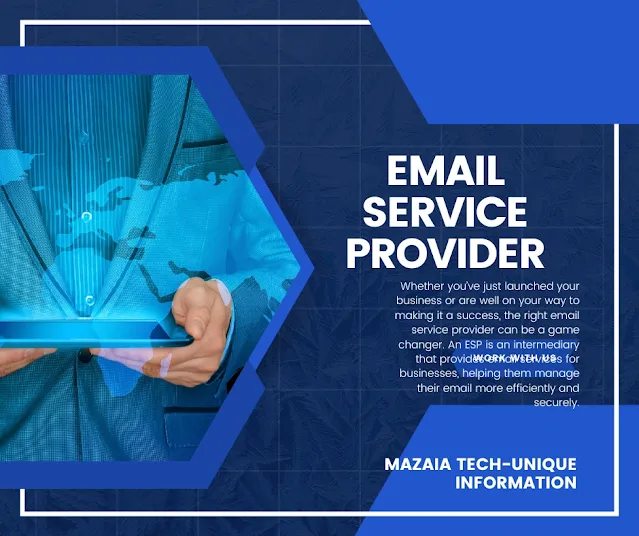How to Choose the Best Email Service Provider. Whether you’ve just launched your business or are well on your way to making it a success, the right email service providercan be a game changer. An ESP is an intermediary that provides email services for businesses, helping them manage their email more efficiently and securely. Anyone who has worked in an office knows how much of a hassle email can be. There are so many different inboxes and addresses to keep track of, not to mention all the spam that goes with it.
 |
| How to Choose the Best Email Service Provider |
How to Choose the Best Email Service Provider
Thankfully, there is now software that makes things much easier for everyone involved. An ESP will provide you with all the tools you need to manage your company’s inboxes securely and efficiently. Here’s everything you need to know about these services and which one will work best for you and your business needs.
What is an Email Service Provider?
An email service provider, or ESP, is a company that provides email hosting and/or other email-related services for businesses. ESPs provide the same type of email services that would be offered by an internet service provider for email, but for businesses. ESPs can host your company’s email or help you transition from your current email host to a new one. An ESP can also provide a number of email-related services, such as email marketing, email security, analytics, and email continuity.
 |
| Email Service Provider |
Email marketingrefers to the practice of using email to generate sales leads and make more sales. Email security refers to protecting your company’s emails against viruses, hackers, and other threats. Analytics refers to tools that monitor things such as open rates and click-through rates. Email continuity refers to the ability to keep your emails running even if your primary email server goes down.
Why Using an ESP is Important
There are many reasons to use an ESP, including the following:
- - Improved Security - By hosting your emails with an ESP, you are better able to protect your data.
- - Better Email Management - An ESP simplifies email management across all devices and all inboxes.
- - Improved Brand Recognition - Your business’s emails will be consistent and recognizable, thanks to branding tools offered by an ESP.
- - Improved Collaboration - Collaboration tools allow your team to share information more efficiently.
- - Better Reporting - ESPs offer analytic tools that automate reporting. - Better Outreach - ESPs offer outreach tools that make outreach more efficient.
How to Choose an ESP
When it comes to choosing the right ESP, the choice is up to you. But before you start shopping around, there are a few things you should consider.
 |
| Choose an ESP |
- - What Types of Emails You’ll Host - If you plan to host your customers’ emails, you’ll want to look for an ESP that specializes in hosted email. This is the best option for businesses that will use their email service to send marketing emails and newsletters.
- - What Devices You’ll Use - If you’re using Gmail and want to stay consistent, a hosted email might be the best choice for you. Cloud-based ESPs can be accessed from almost any device.
- - How Many Emails You Send - If you send a lot of emails, you might want to consider an on-premises email hosting solution. This is best if you plan to send high volumes of emails.
- - How Much You’ll Spend - You can get just about any type of ESP for just about any budget. You may want to shop around to see what’s available at different price points.
4 Best Practices When Working With an ESP
Make sure you and your team are aware of these best practices and remember that email security starts with your end user. If you are using an ESP and you’re not sure if you’re employing these best practices, you should find out and take steps to address them.
 |
| Practices When Working With an ESP |
- - Stay Organized- Make sure everyone knows what inbox they’re supposed to be using. Create rules and filters to help keep things organized.
- - Create Strong Passwords - Make sure everyone knows how to create strong, unique passwords that they don’t use anywhere else.
- - Turn Off Autopilot - If you have marketing emails set to go out at a certain time each day, make sure you’re there to make sure everything is correct.
- - Use DMARC - This lets you take control of your reputation and keep spammers from stealing your brand’s name.
2 Security Tips for Working with an ESP
- - Be Selective about What You Send - If you don’t have any customers, you don’t need to be sending emails. Be selective about what you send and to whom. This will help you avoid spam filters and protect your brand.
- - Use Strong Passwords - Your employees and ESP should use strong passwords. This will keep hackers from getting into your emails and stealing your data.
An ESP will offer a centralized hub for all of your company’s email communication
When it comes to email, there are many options out there, but not all of them are equally good. If your emails aren’t being delivered, aren’t being opened, or getting marked as spam, it’s time to switch providers. An ESP will offer a centralized hub for all of your company’s email communication and provide the features you need to manage it all efficiently.
Choosing the right ESP can be a daunting process, but it’s one that’s well worth the effort. When you have an ESP that works for you and your business, you’ll see the benefits immediately in terms of brand recognition, outreach, and customer service.